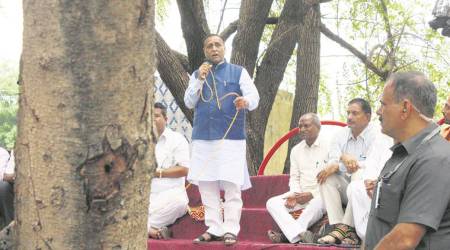 Villagers await their turn for the NDRF boat at Banas river to take them to their houses on the other side. Javed Raja
Villagers await their turn for the NDRF boat at Banas river to take them to their houses on the other side. Javed Raja
The villagers along the Banas river are still trying to grapple with the havoc that floods in the Banaskantha district wreaked, while memories of the ‘nightmare’ continue to haunt them. Even a week after the administration started carrying out relief operations these parts have remained inaccessible to them. Having lost everything to the floods, survivors from different villages blame the Narmada canal for the destruction. The flood claimed 35 lives in Kankrej taluka alone, out of the 60 from Banaskantha district.
A resident of Khariya village, Vansinh Vaghela while collecting the debris of his house says, “The only cause of destruction in these villages is the Narmada main canal that runs over Banas river. The narrow canal failed to hold the water that came with the overflowing Banas river and flooded our villages.”
Natwarsinh Vaghela (50) from Khariya village and his wife sat on a tree for almost 40 hours till the water receded to a level unthreatening to life. He said, “We were working in the fields that night when the water hit us.”
Baluba Vaghela (50), who was rescued by an air force team after spending 40 hours on the roof of his house, lost his 70-year-old uncle in the flood.
Lakshmansinh Thakore, former sarpanch of Mota Jampura village said, “Even after a week, the situation there is horrible. There is still knee-deep water, remains of houses and dead animals lying rotten.”
As evening approaches, the survivors grow restless realising, that the NDRF teams would call the day off any minute. Srirambhai Joshi, a primary school teacher at Katkor government school explains, “These boats operate from 8 am to 6 pm. Unless there is an emergency, they stop ferrying villagers and relief work after 6.”







